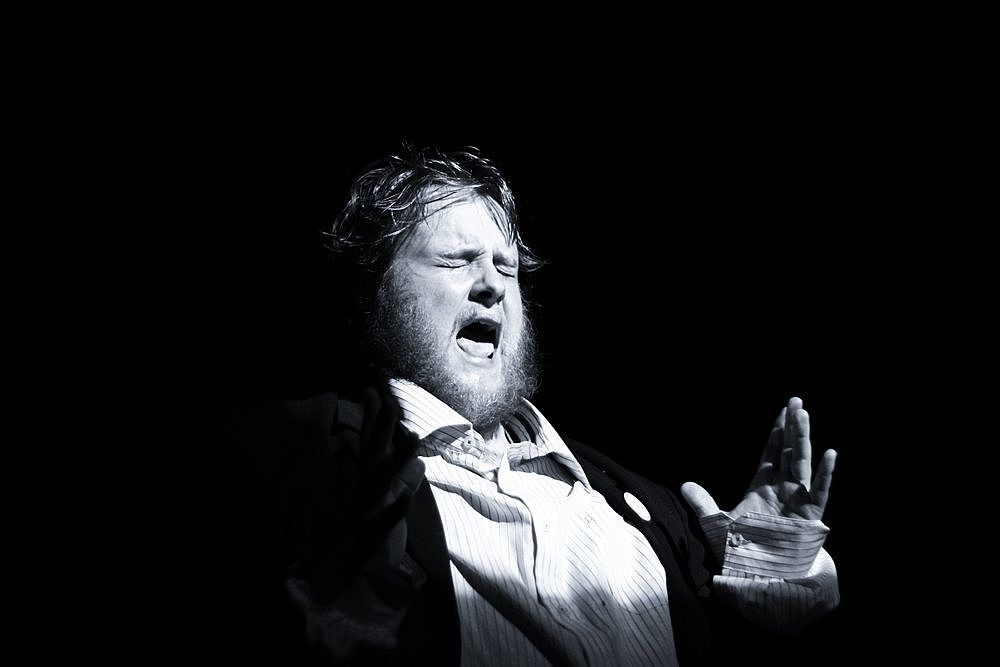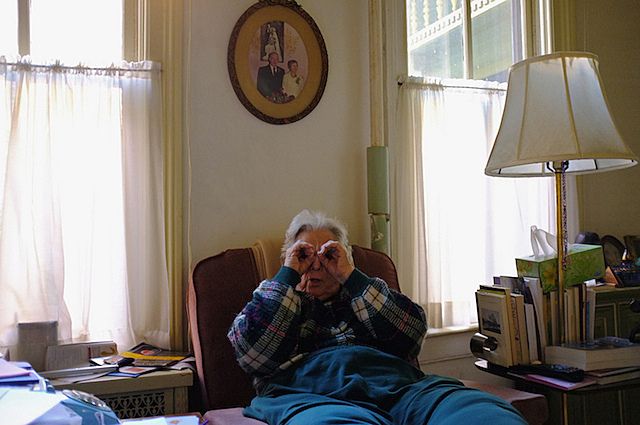The Uther Dean Double Bill: A Tandem Review
Melissa Laing reviews the two shows which made up Uther Dean's double bill last week at the Basement
Melissa Laing reviews the two shows which made up Uther Dean's double bill last week at the Basement: Everything is Surrounded By Water and A Public Airing of Grievances.
In his Loose Canon entry last week, new Auckland transplantee Uther Dean was introduced with the words “he used to live in Wellington and make theatre; now he lives in Auckland and makes comedy.” It’s a description that demarcates the two poles of the works he presented back-to-back at the Basement that same week: Everything is Surrounded by Water and A Public Airing of Grievances.
Everything is Surrounded by Water is an older theatre work co-written with director Hannah Banks. It was first performed in 2014 as a 45-minute monologue in living rooms around Wellington. The show has since grown to 75 minutes but still holds the simplicity and intimacy of its origins. Uther sits in a simple classroom wood-and-metal chair and tells us four interwoven stories about Ben, Uther’s soul, cuttlefish and the French girl. These stories fold back in on themselves repeatedly, forming a cohesive narrative out of coincidence, betrayal, loss, and reinvention. Slowly they build to a climax of self-realisation performed in front of everyone he has ever met.
The careful and clever script crafting in Everything is Surrounded by Water reminds me of the fabulism present in Margaret Mahy’s Young Adult fiction, Isabel Allende’s magic realism and Italo Calvino’s allegorical fiction.
It starts with a dent in the wall and a bump on the head; the bump fitting into the dent. Both are the result of a self-destructive banging of head against wall in an attempt to end it all. With that beginning, delivered with a skilful cadence and intensity, we are brought into Uther’s world where things are both bad and good, filled with social anxiety, strangeness and artworld in-jokes. In a classic tale of cultural and class transformation Ben, a socially awkward, sports-loving guy is taken in hand and reformed into the image of a cool and cultured young man by a woman undertaking her master’s in performance studies. He then discovers that her love was feigned, and his transformation presented as a product of her art. Here Ben’s story intersects with Uther walking home after an evening out. Ben impulsively punches him, triggering Uther’s journey of self-discovery through his past and on foot through the city of Wellington.
The careful and clever script crafting in Everything is Surrounded by Water draws heavily on literary traditions of storytelling. It reminds me strongly of the fabulism present in Margaret Mahy’s Young Adult fiction, Isabel Allende’s magic realism and Italo Calvino’s allegorical fiction. Souls can be given away on yellow post-it notes and their absences can be seen on cat scans. Cuttlefish can and do manifest themselves as more effective chameleons than chameleons. Like the Mahy novels, it embeds its exploration of the magical possibilities of imagination in a hyper local New Zealand town.
Everything is Surrounded by Water is a compelling and highly funny story delivered with a wry and warm self deprecation. In its performance, Uther moves smoothly between segments of rehearsed monologues and improvised asides, maintaining a pacing that sweeps us and the narrative along to its culmination. Throughout, the audience is treated as smart and engaged parts of the social and intellectual network the story draws on.
Uther performs behind a mic stand, delivering a sequence of jokes about relationships, self-loathing, signature songs, yoplait, jobs and superheroes.
A Public Airing of Grievances was created in 2016 for the New Zealand International Comedy Festival and it’s framed within the conventions of standup comedy. Wearing the same black trousers and scrawled dog t-shirt as in Everything is Surrounded by Water, Uther performs behind a mic stand, delivering a sequence of jokes about relationships, self-loathing, signature songs, yoplait, jobs and superheroes. His standup comedian persona is a crafted combination of geeky obsessiveness and extroverted self reflection. He’s a pop-culture referencing yogurt-necking antihero adultman whose superpower is responsibly calling the AA, travelling with his self hatred sitting in the passenger seat. The jokes and the tragedy are anchored around a summer holiday job at a Christian camp taken to get away from his recent breakup where he meets an alienated and lost child. The child stands in for all those people (including Uther) who couldn’t quite get the brutal social interplay of childhood right and are still slowly bleeding from it. Her grievance – the actions of her peers and the hurts they have dealt her have filled her up with pain, to the point she can no longer feel.
Moments from the dramatic monologue have more sticking power in my memory than those from the standup show. Without the glue of cohesive narrative, the individual jokes, while enjoyed in the moment, slipped from recollection faster. Nonetheless, in the moment I laughed, a lot. Like all life-based comedy, its humour drew on the relatability of the scenarios - the little things you do with your partners, the bad break ups, weird obsessions, and poor self image. Unfortunately, with the possibility of comparison afforded by presenting the two works back-to-back, A Public Airing of Grievances fails to live up to the standard set by Everything is Surrounded by Water. While very entertaining, it’s a less substantial work, therefore suffering somewhat from the comparison.
While on the surface a monologue and a stand-up show seem very similar - one person in front of an audience telling stories - the respective forms are very different.
Both works take place in the same spare environment of the Basement Studio. The audience is arranged along two sides of the stage area and in each show there is only one major prop - in Everything is Surrounded by Water, a chair, and in A Public Airing of Grievances, a mic stand. These two different props clearly signal the distinct narrative and theatrical approaches of each show. Everything is Surrounded by Water is delivered intimately, without amplification, and in the main the performance is physically restrained. The work compels the audience’s attention with a narrative arc holding the tension of the unknown. The audience’s engagement builds alongside the narrative, and the tension relaxed with the show’s resolution at the end.
In contrast, A Public Airing of Grievances is constructed around carefully-crafted laughable units, delivered one after another into a microphone, with water bottle-aided pauses to leave room for the expected laughter. However, each dramatic or story unit stands alone as it engages and releases the audience’s tension.
As monologuist and standup comedian Megan Gogerty argues, while on the surface a monologue and a stand-up show seem very similar - one person in front of an audience telling stories - the respective forms are very different. This primarily lies in the way tension is deliberately created and released. Audiences for each form anticipate different structures. Audiences for narrative work begin relaxed, allow themselves to be drawn in and build their tension alongside the narrative arc, expecting a culminating release at the end. Audiences for comedy, begin tense – anticipating possible comedic failure and relax as the jokes flow successfully.
Uther announces his permanent arrival in Auckland with a laugh-filled and thought provoking 'tada'. In doing this he’s cleared the ground to make new works, set here in Auckland. We look forward to seeing them.
The differences in narrative and theatrical forms are also reflected the key themes of each work. Everything is Surrounded by Water is built around the twin ideas of interconnectedness and the construction of self. Early on in the first act, Uther introduces us to the word ‘sonder’ – the realisation that other people are also living lives as rich and complex as your own. The rambling and expansive quality of a narrative allows the idea of ‘sonder’ to play out, the story taking the time to diverge and flesh out the people who appear. In contrast, A Public Airing of Grievances explores feelings of isolation and self-loathing. The people referenced exist as props for the main character, rather than fully-formed individuals. Its quick fire delivery exchanges the complexity of characters for the immediate gratification of the tightly structured joke.
What is common to both works is that they weave Uther’s autobiographical experiences of living with depression, self-destructive behaviours, and hallucinations into the mix. They speak directly to the people who didn’t fit easily in the world as children, who are struggling to feel like they’re fitting now. By finding the humour in emotional hurt, broken trust, and the pervasive sense that you’re not doing ‘life’ properly, Uther brings these life traumas out into the open and enables us to share in their commonality, and in the sharing and laughing, feel just a little bit better about it all.
With these two shows looking back to his past life as a Wellingtonian, Uther announces his permanent arrival in Auckland with a laugh-filled and thought provoking 'tada'. In doing this he’s cleared the ground to make new works, set here in Auckland. We look forward to seeing them.

